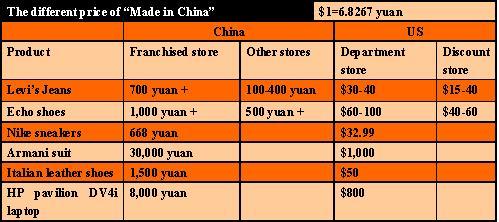-
-
China Daily E-paper
Web Comments
Stop worshiping foreign brands
By Gao Qihui ( chinadaily.com.cn)
Updated: 2010-03-30 16:48
 |
Large Medium Small |
Nowadays, in China so many fans develop a fondness for foreign brands in spite of their high prices, believing that the foreign brands are an international symbol of their outstanding taste and social status.
However, except those universally recognized luxury brands, such as Louis Vuitton, Rolex and Rolls-Royce, most international brands coveted by Chinese fans have nothing to do with nobility or elegance. The bubble of this obsession over foreign brands is inevitably popped when these fans travel to the US or Europe, where most international brands are born.
For instance, on Fifth Avenue in Manhattan, in discount stores, a pair of Levi's jeans cost only $15-30, but the same jeans will be sold for at least 700 yuan ($102) in China. Such a big gap generally exists for many other international brands, such as Nike, Adidas and HP. Those international brands, which are upheld by Chinese fans as the symbol of outstanding social status and taste, are just common necessities in the US and other countries. Confronted with the lure of such low prices, it is understandable why there are groups of Chinese travelers rushing to these stores in New York.
Does that sound absurd? Not absurd enough until you find that most of these brand products are made in China.
|
 |
|
Source:Guangzhou Daily |
Here comes a question: How can these foreign brand products be sold at a much higher price in China?
The monopoly of the brand effect gives foreign brands advantages and privileges. The monopoly originates from the Chinese consumers' old and firm belief that foreign brands have better design, quality and taste, so that foreign brands become a high standard of lifestyle.
This obsession can be traced back to the beginning of China's reform and opening-up. Before that, China could not manufacture high-quality and well-designed products because of the backward technology and conception. After China opened up, people found the imported products were much better than domestic ones in all respects, and meanwhile they were rare in the market, which led to anyone who got imported home appliances or other products being envied by others. From then on, the obsession began to take root in the Chinese consumers.
However, as China developed its manufacturing technology and became the world's factory, some home-made products can now reach the international standard in all aspects and they are sold at a much lower price, but foreign brands are still enjoying a superior position.
The recent recall of flawed products from HP and Toyota may wake up the Chinese fans from their obsession. Foreign brands should be pulled down to earth from their high position of blind worship. Sometimes, they are more deceptive than what we imagine. This was reflected by the recent Chinese consumers' complaints about foreign LCD TV producers who shortened the warranty period for main components from the normal three years to two without authorization. According to China's regulations, TV set producers must provide a three-year warranty of their main components.
"International" does not mean "prestigious". If one Chinese ordinary company opens a branch store in the US, then it will be called an international company. Chinese fans of foreign brands should rethink their obsession rationally and come to their senses. Wake up, my compatriots, and open your mind up to every brand, regardless of whether they are domestic or foreign.









